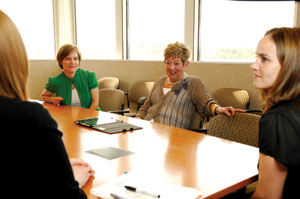Survivor to Supporter
June 22, 2011 | Nancy Humphrey
Carol O’Hare has lived through the ups and downs of cancer over the past 14 years – all at Vanderbilt-Ingram Cancer Center. A stage III breast cancer survivor, she was diagnosed in 1997 and treated by David Johnson, M.D., who was director of the Division of Hematology and Oncology at the time, and Dan Beauchamp, M.D., who was her surgeon. After a course of cutting-edge adjuvant chemotherapy, a modified lumpectomy and complete nodal dissection, and a full course of radiation, O’Hare has remained cancer-free since August 1998.
She admits that she and her husband, Jim, a prominent Nashville attorney, were “blindsided” by the diagnosis, but they dove in trying to learn all they could about breast cancer. Research came naturally to them both – her father was a neurophysiologist and Jim was constantly researching the law.

Cancer survivor and fellowship supporter Carol O’Hare (center) meets with current chief fellow Cynthia Shepherd, M.D., (far left), and incoming co-chief fellows Natalie Spradlin, M.D., (far right) and Christine Lovly, M.D., Ph.D., (foreground) during a recent visit to Vanderbilt-Ingram. (Photo by Anne Rayner)
“We both know about sitting down and trying to understand how something is going to work,” she said.
Then in 2004, Jim – who was healthy, active and a never-smoker – was diagnosed with stage IV lung cancer at Vanderbilt- Ingram just a few weeks after he and Carol had completed a 100-mile bike tour for the LiveStrong Foundation. His only symptom had been a nagging, throat-clearing cough. Less than a month later, he was dead from a pulmonary embolism, a complication resulting from his cancer.
Again, Carol was overwhelmed by the kindness and guidance of the oncologists, especially Johnson, who left Vanderbilt last year for the University of Texas Southwestern in Dallas.
She contemplated how she could benefit Vanderbilt-Ingram, the place that had saved her life and had fought to save her husband’s. She agreed to give a substantial ongoing donation to establish “The Carol and Jim O’Hare Fund,” an endowed fund to support the training of Hematology/Oncology Fellows.
O’Hare knows firsthand the importance of a well-trained and adequate oncology workforce and hopes that her support will help arm the next generation of oncologists with the training and tools they need to make progress in understanding and treating cancer.
She is especially hopeful that some fellows may go on to help solve the perplexing problem close to her heart: lung
cancer in never smokers.
“I am very excited about Vanderbilt taking a lead role in research to discover the reasons for lung cancer in never smokers,” she said. “Lung cancer is a terrible, terrible disease. All cancers are, but this one….they tell you not to give up hope, but it’s hard. Vanderbilt-Ingram Cancer Center is a remarkable place. I have a tremendous amount of respect for the team.”
